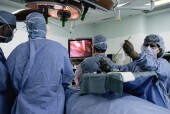Surgeon's Preferences Dictate Choice of Kidney Cancer Surgery
Candidates for less radical procedures may not be getting them, study says.
By Amanda Gardner
HealthDay Reporter
|
E-mail this article
Subscribe to news
Printer friendly version
|

(SOURCES: David Miller, M.D., clinical instructor, urology, University of California, Los Angeles, David Geffen School of Medicine; Patrick Lowry, M.D., assistant professor, surgery, Texas A&M Health Science Center College of Medicine, and section head, laparoscopy and endourology, Scott & White Memorial Hospital, Temple; April 15, 2008, Cancer)
MONDAY, March 10 (HealthDay News) -- A surgeon's skills and preferences may dictate treatment choices for kidney cancer more than clinical factors such as tumor size or the patient's general health, a new study finds.
This means many patients who are candidates for less radical surgical procedures, such as a partial nephrectomy where only part of the kidney is removed, may not be getting them, the California researchers said.
"The world of medicine is slow to incorporate new technology," acknowledged Dr. Patrick Lowry, an assistant professor of surgery at Texas A&M Health Science Center College of Medicine. "It's kind of like a family tree. When more people are trained in it, they go out and spread it to others."
"Partial nephrectomy is more difficult and has more potential complications, and people may shy away from it," added Lowry, who's also section head of laparoscopy and endourology at Scott & White Memorial Hospital in Temple.
Radical nephrectomy, or removing the entire kidney, remains the gold standard for treating early-stage kidney cancer. While the procedure has a greater than 90 percent cure rate, it increases the risk of developing chronic kidney disease, the study authors said.
Over the past two decades, partial nephrectomy and laparoscopy (minimally invasive surgery) have started to make inroads in the field. These newer alternatives are easier on the patient and equally effective at controlling the cancer, yet not used anywhere nearly as often as radical nephrectomy, the researchers noted.
"On a national level, less than half of patients are getting one or the other [partial nephrectomy or laparoscopy] for small tumors," said study author Dr. David Miller, a clinical instructor in urology at the University of California, Los Angeles. "The question is whether there's some reason at a patient level, or that physicians are not doing these procedures for one of any number of a variety of reasons. We tried to quantify that."
For the study, the researchers looked at 5,483 Medicare beneficiaries who had undergone surgery for localized kidney cancer between 1997 and 2002. The study was part of the Urologic Diseases in America Program, funded by the National Institute of Diabetes and Digestive and Kidney Diseases.
Slightly more than 11 percent of the patients had a partial nephrectomy (43 performed laparoscopically) while the vast majority -- 88.9 percent -- had the entire kidney removed (515 laparoscopically).
The findings will be published in the April 15 issue of Cancer.
"For partial nephrectomy, the only thing that explained more of the variation in use than the surgeon you saw was the size of the tumor," Miller said. "For laparoscopy, the surgeon was more important than any other characteristic."
"If we believe as a specialty and as a society that newer procedures are beneficial, we have to think about how to tackle it," he added.
Patients also have a role to play in guiding their care, Miller said.
"Patient education and understanding and self-advocacy are important in discussing, with the primary doctor or urologist or surgeon," the treatment options, he said.
For instance, patients can ask questions like: "'What are the different treatment options available for this tumor? I've heard about partial nephrectomy. Is that a possibility in my case and, if it's not, why isn't it? If you think the whole kidney needs to be removed, what about the possibility of having it done with less invasive surgery?'" Miller said.
More information
The U.S. National Cancer Institute has more on kidney cancer.
Copyright © 2008 ScoutNews, LLC. All rights reserved. 
HealthDayNews articles are derived from various sources and do not reflect federal policy. healthfinder.gov does not endorse opinions, products, or services that may appear in news stories. For more information on health topics in the news, visit the healthfinder.gov health library.